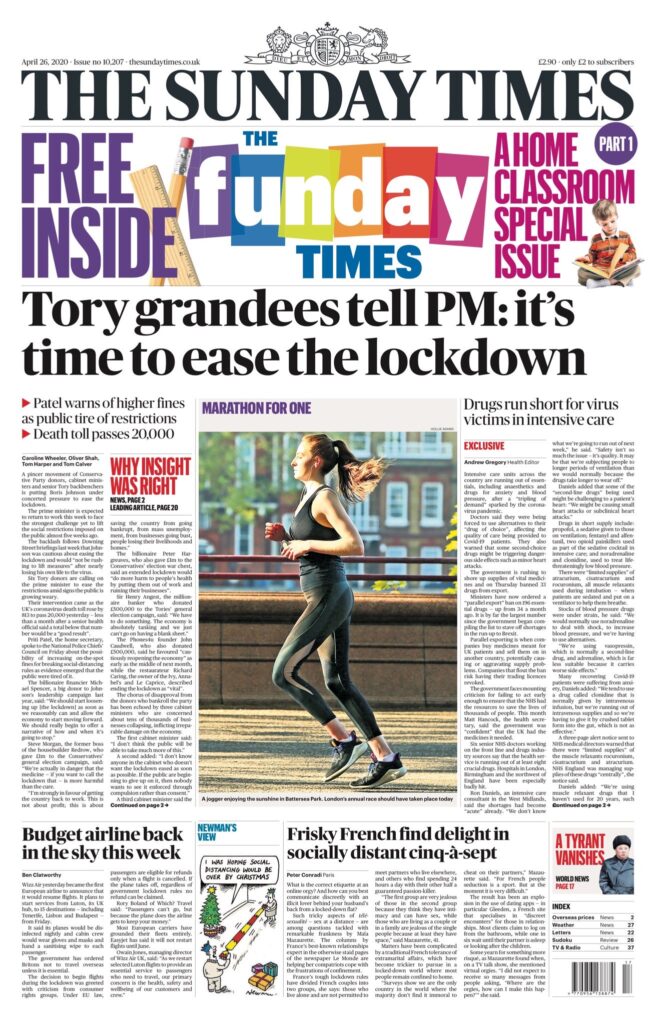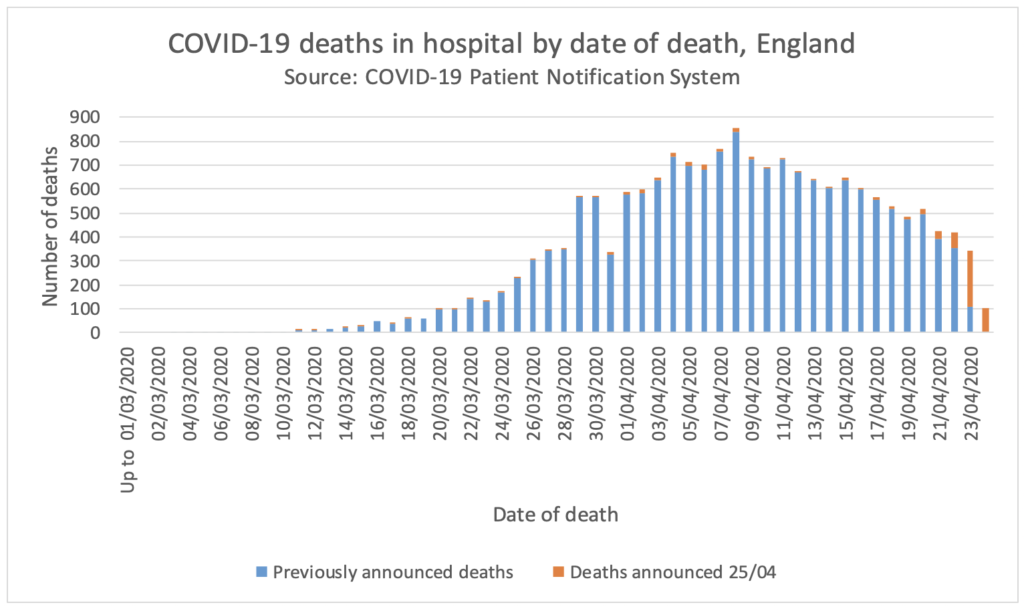
Good news on the front page of today’s Sunday Times: “Tory grandees” are heaping pressure on the Prime Minister to end the lockdown. “A pincer movement of Conservative Party donors, cabinet ministers and senior Tory backbenchers is putting Boris Johnson under concerted pressure to ease the lockdown,” it reports.
Another encouraging development is an exclusive on the front of today’s Mail on Sunday revealing that the Government has ordered 50 million antibody tests that have been devised by scientists at Oxford working for the Rapid Testing Consortium. The newspaper claims the tests cost £10 each and give results in 20 minutes. Let’s hope they’re more reliable than the 33 FDA-approved PCR tests that infectious diseases expert David Crowe reviewed for Lockdown Sceptics yesterday. You can read David’s article here.
The Sunday Telegraph leads with a scoop of its own: anyone arriving in the UK from abroad — including British nationals — will have to self-isolate for two weeks under the Government’s proposed exit strategy. This is already the case in Singapore, which has only recorded 12 deaths from COVID-19 to date. But won’t that devastate the tourist trade? And what about British people who’ve already booked their summer holidays? Will they still leave the country knowing they’ll have to self-isolate for two weeks on their return? It seems a little over-the-top when a simple screening programme at our airports and ports could achieve the same result.
Will Boris’s exit strategy involve the quarantining of the over-70s until the end of the year (and possibly beyond)? A reader has complained that it would be a bit hypocritical of the Government to propose the long-term isolation of the elderly on the grounds that they’re particularly vulnerable to the virus, but not BME people, who also appear to be at greater risk than others. (Imagine the uproar if Boris proposed that!) To this list we could add anyone with the health conditions associated with an above-average risk of dying from COVID-19, such as diabetes, heart disease, chronic lung disease, a compromised immune system, etc. And anyone who’s either overweight or obese, which is 64.3% of all British adults. Being overweight is one of the biggest risk factors when it comes to being admitted to hospital with a severe form of COVID-19. Between two-thirds and three-quarters of those admitted to ICU in the UK with coronavirus are overweight. Or perhaps all of these groups could be allowed to return to normal life provided they take up smoking, given that nicotine is emerging as one of the most effective prophylactics against catching the disease. One study in France found that smokers were four times less likely to contract COVID-19 than non-smokers. My colleague Christopher Snowdon, a long-standing critic of the anti-smoking lobby, is cock-a-hoop about this finding.

A couple of opinion polls out today show the public’s enthusiasm for the lockdown beginning to wane. According to Opinium, 53% of people want restaurants, offices, shopping centres and schools to reopen as soon as new infections decrease (which they have, obviously) and are prepared to accept periodic closures, i.e. switching restrictions on and off according to whether the infection rate is climbing or falling. Approval of the Government and its handling of the crisis has dropped for the second week in a row, according to Opinium, a result echoed in an ORB poll for the Telegraph. The percentage of respondents who approve of the Government’s handling of the crisis has declined to 52%, down from 59% earlier this month.
And Britain has finally chalked up its first anti-lockdown protest. Piers Corbyn, brother of Jeremy, led a demonstration in Glastonbury yesterday. In his speech, Corbyn made some good points – the NHS’s focus on treating COVID-19 patients has led to other patients being neglected – but he also made some not-so-good ones, claiming the reason the Government wants us to stay two metres apart is so it can identify us using satellites. The Mail has the story. Meanwhile, 200 demonstrators gathered in Berlin on Saturday to protest about extreme social distancing measures.
Yesterday I pointed out that celebrities weren’t having a good crisis. Neither is the European Union. Its latest act of self-harm is to censor its own report about how governments spread disinformation about coronavirus. The report was originally critical of China, but has now been heavily watered down after pressure from Chinese officials. According to the New York Times, the first draft of the report was critical of China’s for orchestrating a “global disinformation campaign to deflect blame for the outbreak of the pandemic” as well as spreading false allegations against French politicians, accusing them of using racist slurs against the head of the WHO. All these passages have been excised, says the Times. Read the story here.
Conservative intellectual Andrew Sullivan has written a good column in New York magazine about the psychological toll that self-isolating is taking on him – and he admits he’s better off than most. It includes this quote from a piece by Damon Linker in the Week on the same subject: “A life without forward momentum is to a considerable extent a life without purpose — or at least the kind of purpose that lifts our spirits and enlivens our steps as we traverse time. Without the momentum and purpose, we flounder. A present without a future is a life that feels less worth living, because it’s a life haunted by a shadow of futility.”
The Wall St Journal published a great interview yesterday with arch sceptic John Ioannidis, Professor of Medicine at Stanford. Readers will recall that Ioannidis was one of the first senior scientists to criticise the overreaction of governments to the coronavirus crisis, calling it a “once-in-a-century fiasco”. Here are some highlights:
[Professor Neil Ferguson and his team at Imperial College] used inputs that were completely off in some of their calculations. If data are limited or flawed, their errors are being propagated through the model. . . . So if you have a small error, and you exponentiate that error, the magnitude of the final error in the prediction or whatever can be astronomical.
There’s some sort of mob mentality here operating that they just insist that this has to be the end of the world, and it has to be that the sky is falling. It’s attacking studies with data based on speculation and science fiction. But dismissing real data in favour of mathematical speculation is mind-boggling.
We have some evidence that bad news, negative news [stories], are more attractive than positive news – they lead to more clicks, they lead to people being more engaged. And of course we know that fake news travels faster than true news. So in the current environment, unfortunately, we have generated a very heavily panic-driven, horror-driven, death-reality-show type of situation.
One of our own senior scientists who’s emerging as a bit of a sceptic – Professor Karol Sikora – pointed out on Twitter this morning that the daily death tolls released by NHS England are not in fact a record of those who’ve died in the previous 24 hours. (Off-Guardian drew attention to this on April 23rd in a post entitled ‘Why you can’t trust the UK’s “daily” COVID-19 updates‘.) Sikora wrote: “Of the reported 711 NHS England fatalities yesterday, only 105 were from the previous day. Many were from weeks ago. Using accurate and current data shows a much more encouraging picture.” (In fact, 32% of the 711 deaths reported by NHS England yesterday occurred between March 11th and April 17th, according to the Centre for Evidence-Based Medicine.) Sikora refers people to a section of NHS England’s website that records how many people have actually died in the previous 24 hours. Here is the data on this that NHS England released yesterday, clearly showing deaths peaking at between 800 and 900 on April 8th and declining to ~100 on April 24th.

And, of course, there’s also the problem of doctors dutifully recording coronavirus as the cause of death, when the patient in question may or may not have died of COVID-19. For deaths that occur outside hospitals – such as in care homes – that happens if the doctor merely suspects the patient had coronavirus without any testing evidence. In Pennsylvania, officials have had to remove hundreds of coronavirus deaths from the state’s official death count, following pushback by local coroners. You can read that story here.
Finally, Dan Hannan has written a good column in today’s Sunday Telegraph, arguing out that if Sweden’s more modest social distancing measures prove effective then lockdowns will have been for nothing. He points out that lockdown zealots appear to be willing Sweden to fail, scarcely able to conceal their glee whenever the death toll ticks up. Well, I have some bad news for them: yesterday’s daily toll in Sweden was 40, bringing the total number of deaths to 2,192, around 10% of ours.
As always, a big thanks to those readers who donated yesterday. It’s your donations that enable me to spend so much time maintaining this site and doing the daily updates. If you’d like to donate, click here.









To join in with the discussion please make a donation to The Daily Sceptic.
Profanity and abuse will be removed and may lead to a permanent ban.